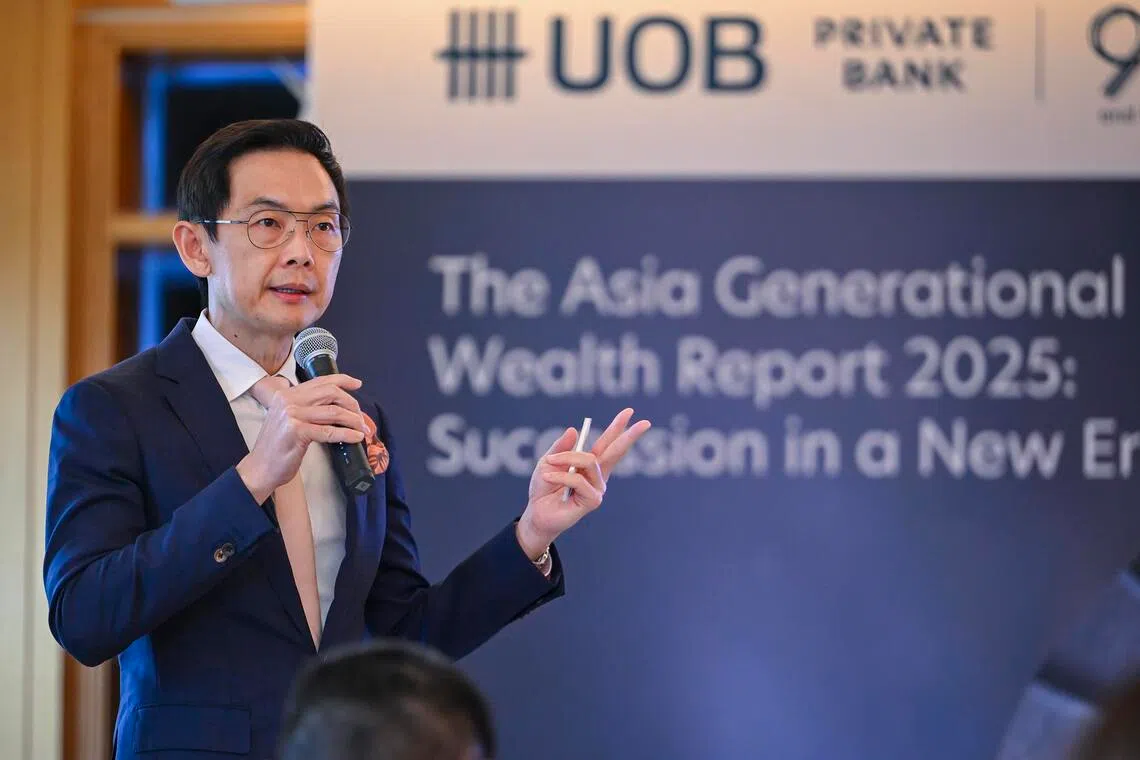When silence isn’t golden: Succession challenge looms for Asia’s wealthy families
Sign up now: Get ST's newsletters delivered to your inbox

Panelists (from left) Mr Chew Mun Yew, Head of UOB Private Bank; Associate Professor Yupana Wiwattanakantang, NUS Business School; and Mr Ernest Saudjana, senior partner at Boston Consulting Group, at the launch of White Paper “The Asia Generational Wealth Report 2025: Succession in a new era”.
PHOTO: UOB
Follow topic:
- Asia's private wealth is set to surge to US$99 trillion by 2029, a quarter of the global total, according to a new report by UOB, BCG and NUS.
- As Asia's fortune is relatively young, limited generational transfer experience can make families more prone to family conflicts, which can disrupt business operations.
- Experts urge families to embrace transparency and set up clear governance structure through family charters to reduce the risks of ugly disputes.
AI generated
SINGAPORE – When Mr Zong Qinghou, founder of the Chinese beverage empire Wahaha, died in February 2024, public tributes poured in for the self-made tycoon who was once China’s richest man.
But a year later, that reverence gave way to turmoil when his three “secret children” from an extramarital affair sued his only publicly acknowledged daughter over their inheritance
The case has become a cautionary tale on how silence and secrecy in succession planning can cost business magnates not only family harmony, but also the reputation of the companies they spent decades building.
More founders in Asia now acknowledge the need for proper succession planning after seeing the “spectacular failures” of families who did not get it right, said Mr Chew Mun Yew, head of UOB Private Bank.
He was speaking at a recent briefing to launch the Asia Generational Wealth Report 2025: Succession In A New Era, which UOB Private Bank jointly authored with the Boston Consulting Group (BCG) and the NUS Business School.

Head of UOB Private Bank Chew Mun Yew said more high-net-worth clients are interested in succession planning now.
PHOTO: UOB
Mr Chew said UOB has nearly doubled its number of high-net-worth clients since 2021, with close to 70 per cent of them being business owners.
This mirrors the staggering growth in Asia, whose share of global private wealth has surged from 6 per cent to 21 per cent over the past 25 years, he said.
By 2029, this figure is projected to reach US$99 trillion (S$129 trillion)
But recognising the need for succession planning is one thing; acting on it is another. The study shows that more than a third of family business founders are reluctant to let go, as they are deeply attached to their companies and want to continue steering them or exerting control through veto rights.
Of the 46 founders surveyed, 37 per cent said they will hand over the reins only if poor health leaves them with no choice. Also, 37 per cent of them said they prefer to decide family wealth matters independently, and 28 per cent said they have prepared wills that are not disclosed to their heirs.
“With many of Asia’s fortunes still relatively young, limited generational experience in succession planning can make families more prone to delayed disclosure – leaving them vulnerable to conflicts,” the report noted.
“Complex family structures or extramarital heirs add further volatility, and secrecy often triggers disputes.”
The good news is that younger or next-generation business leaders are more open to adopting a transparent approach.
Only 13 per cent of the 69 surveyed said they make decisions on wealth matters alone. In fact, 87 per cent hold family meetings and 52 per cent go a step further by establishing family charters – written documents that set out the ground rules for managing family affairs, from business ownership and governance framework to succession planning and conflict resolution.
Mr Ernest Saudjana, a senior partner at BCG who was also at the briefing, said families are becoming more open to the idea of using family charters as a form of governance.
“Very often, the angle is not so much about wealth transfer. It’s about how to build a legacy and make sure the family business (survives) this third- or fourth-generation ‘curse’,” he said, referring to a commonly held notion that wealthy families often struggle to preserve their wealth beyond more than two generations.
One example cited in the report is Royal Selangor, the Malaysian pewter-maker now in its fourth generation of family leadership.
The company has had a family charter in place since 2002, spelling out details like when one must retire and how often the family should get together for retreats, according to an article on IMD Business School’s website. One notable rule is that family members must work elsewhere and gain experience for at least two years before qualifying for a job in Royal Selangor.

Mr Ernest Saudjana, senior partner at BCG, spoke at the launch event for The Asia Generational Wealth Report 2025.
PHOTO: UOB
The study noted that having such clear rules can help families align their expectations and prevent disputes from destabilising the family business.
Associate Professor Yupana Wiwattanakantang of NUS Business School, a specialist in family capitalism, said many families surveyed still prefer their businesses to be helmed by a family chief executive as they fear losing control to an outsider.
According to the report, 72 per cent of the founders see their children as likely successors, although 28 per cent of them acknowledge a lack of interest from their heirs, and 24 per cent believe their heirs are under-prepared.
Prof Yupana said a company’s longevity counts on whether it is led by the best-qualified person, and this person should be appointed based on meritocracy, not birthright. Hence, families should not conflate ownership and leadership, she said.

Associate Professor Yupana Wiwattanakantang of NUS Business School said succession planning is a good chance to set the right mindset for the next generation.
PHOTO: UOB
Beyond the transfer of wealth and leadership, she said families must also focus on the transfer of knowledge – ensuring that the founders’ experience, values and understanding of what makes the business succeed are passed on to the next generation.
Succession planning, she added, is a good opportunity to set the right mindset for the next generation, encouraging them to think long-term, sustain the family legacy, and develop a sense of purpose, not entitlement.
“Like what the Japanese say: You sacrifice yourself, but the house will live.”


